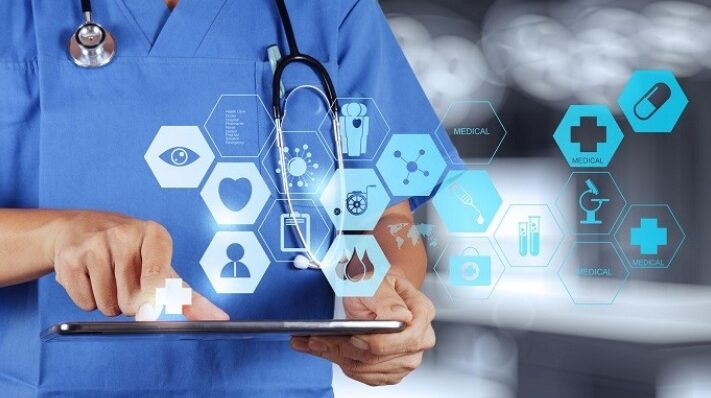
In today’s rapidly evolving healthcare landscape, the integration of technology has become paramount. The seamless implementation of healthcare solutions, driven by technological advancements, holds the potential to enhance patient care, streamline operations, and improve overall efficiency within the industry. This article explores the various facets of implementing healthcare with technology.
Embracing Electronic Health Records (EHRs)
Electronic Health Records (EHRs) have revolutionized the way healthcare providers manage patient information. The transition from paper-based records to EHRs offers numerous benefits, including improved accuracy, accessibility, and data security.
1. Data Centralization:
EHRs consolidate patient information into a centralized digital repository, allowing healthcare professionals easy access to vital data such as medical history, medication records, and lab results.
2. Interoperability:
Interoperable EHR systems enable seamless data sharing between different healthcare facilities. This interoperability enhances coordination of care, reduces duplication, and ensures continuity in patient treatment.
3. Decision Support Tools:
EHRs often come equipped with decision support tools that provide healthcare providers with real-time clinical information, aiding in diagnosis and treatment decisions.
Telemedicine and Telehealth Solutions
Telemedicine and telehealth have gained significant traction, especially in recent years. These technologies enable remote patient consultations, monitoring, and data sharing, offering convenience and accessibility for both patients and healthcare providers.
4. Virtual Consultations:
Telemedicine platforms facilitate video or audio consultations, allowing patients to connect with healthcare professionals from the comfort of their homes. This reduces the need for in-person visits, particularly for routine check-ups.
5. Remote Monitoring:
IoT devices, such as wearable health trackers, can collect vital data and transmit it to healthcare providers for real-time monitoring. This remote monitoring is particularly beneficial for managing chronic conditions.
6. Data Security:
Ensuring the security and privacy of patient data in telemedicine solutions is paramount. Implementing robust encryption and adherence to regulatory standards like HIPAA are essential.
Enhancing Patient Engagement
Patient engagement is a critical component of modern healthcare. Technology plays a pivotal role in engaging patients, fostering a sense of empowerment, and promoting active participation in their own healthcare journey.
7. Patient Portals:
Patient portals provide a secure platform for patients to access their health records, schedule appointments, and communicate with their healthcare providers. These portals encourage engagement and facilitate information exchange.
8. Mobile Health Apps:
The proliferation of mobile health apps has enabled patients to monitor their health, track medications, and receive reminders for appointments and medications. These apps promote proactive healthcare management.
9. Personalized Health Information:
Leveraging technology, healthcare providers can deliver personalized health information and recommendations to patients based on their medical history, preferences, and current health status.
Harnessing IoT Healthcare Solutions
The Internet of Things (IoT) has transformed various industries, and healthcare is no exception. IoT healthcare solutions leverage connected devices to collect and transmit data, opening new avenues for patient care and operational efficiency.
10. Remote Patient Monitoring:
IoT devices, such as wearable sensors and medical implants, continuously collect patient data, allowing healthcare providers to remotely monitor vital signs and intervene promptly in case of anomalies.
11. Asset Tracking:
IoT technology can be used to track medical equipment and assets within healthcare facilities, reducing the risk of loss or theft and ensuring the availability of necessary resources when needed.
12. Predictive Analytics:
IoT-generated data, coupled with advanced analytics, can help predict disease outbreaks, patient readmissions, and equipment maintenance needs, enabling proactive interventions.
Challenges and Considerations
While the integration of technology in healthcare offers immense potential, it also presents certain challenges and considerations that must be addressed.
13. Data Privacy and Security:
Protecting patient data from cyber threats and ensuring compliance with data privacy regulations (such as HIPAA in the United States) is a top priority.
14. Training and Adoption:
Healthcare professionals must be adequately trained to use technology effectively. Encouraging adoption and addressing any resistance to change is crucial.
15. Interoperability Issues:
Ensuring that various healthcare systems and devices can seamlessly exchange data remains a challenge. Industry-wide standards are necessary for true interoperability.
16. Cost Considerations:
Investing in healthcare technology can be costly. Healthcare providers must carefully assess the return on investment and long-term benefits of such investments.
Conclusion
The implementation of healthcare with technology is no longer an option but a necessity. Embracing electronic health records, leveraging telemedicine and telehealth solutions, enhancing patient engagement, and harnessing IoT healthcare solutions can significantly improve patient care and operational efficiency within the healthcare industry. While challenges exist, addressing data security, training, interoperability, and cost considerations can pave the way for a more technologically advanced and patient-centered healthcare ecosystem. As the healthcare industry continues to evolve, the integration of technology will remain a driving force behind its transformation, benefiting both providers and patients alike.